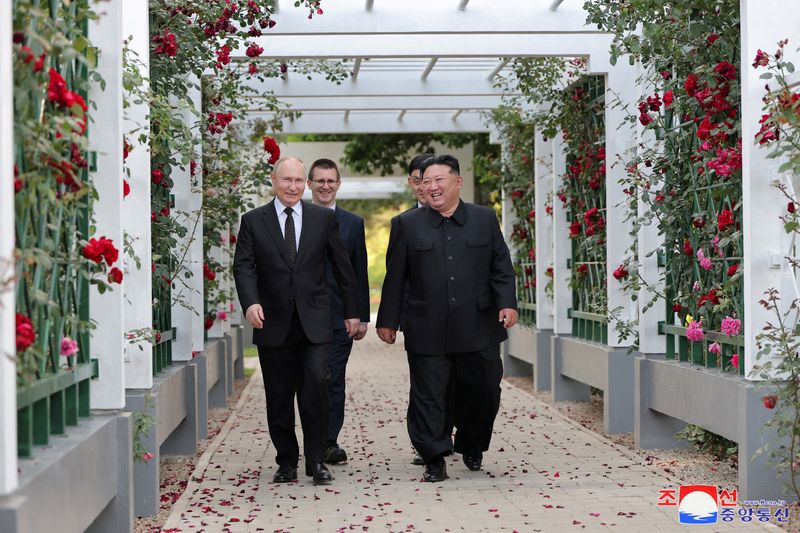By Jack Kim
SEOUL (Reuters) – North Korean leader Kim Jong Un reiterated his commitment to deepening cooperation with Russia in a message to President Vladimir Putin as Pyongyang marks the anniversary of its independence from Japanese colonial rule, state news agency KCNA reported on Friday.
KCNA said it was a response to Putin’s congratulatory message on the Aug. 15 liberation anniversary, in which the Russian leader said the bond forged while Soviet soldiers fought against Japan continues to form the basis of their ties.
“The friendly feelings of the armies and peoples of the two countries, forged and deepened in the bloody struggle against the common enemy, constitute a strong driving force for the development … of friendly and cooperative relations into a comprehensive strategic partnership and invincible comradeship,” Kim said.
In June, Kim and Putin held their second summit in less than a year in Pyongyang, signing a “comprehensive strategic partnership” pact that includes a mutual defense agreement.
The announcement came as South Korea, Ukraine and the United States have leveled accusations that Kim is aiding Russia in its war against Ukraine by supplying rockets and missiles in exchange for economic and military assistance from Moscow.
Kim visited a monument honoring Korean revolutionary soldiers who fought in the resistance against Japan to end colonial rule from 1910 to 1945 and the Liberation Tower where Soviet Red Army soldiers are remembered, KCNA said.
The founder of the North Korean state Kim Il Sung, grandfather of the current leader, was supported by the General Secretary of the Soviet Union Joseph Stalin, who declared war on Japan towards the end of World War II.
The Soviets supported Kim’s communist forces who, after the liberation of the country in 1948, founded North Korea.

North Korean state media made no mention of the unification plan announced Thursday by South Korean President Yoon Suk Yeol, who called for dialogue with Pyongyang and proposed an international conference on human rights in North Korea.
Coming at a low point in inter-Korean relations, Yoon’s plan has been met with skepticism by some experts, who doubt it is realistic to expect Pyongyang to view it as anything other than an existential threat to its regime.





